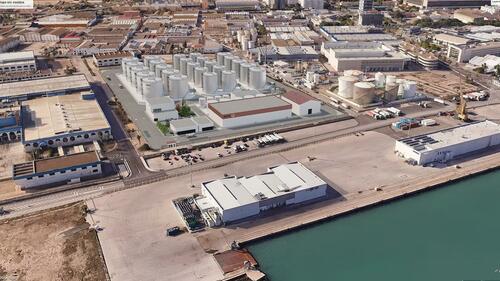Dreexo Energy to Launch Circular Economy Plant in Cádiz, Advancing Sustainable Industry in Andalucía
CÁDIZ, SPAIN — Dreexo Energy, a Spanish clean-tech company specializing in the sustainable processing of industrial byproducts, has announced the construction of a major new facility in the Cádiz Free Trade Zone. The project, entirely Andalusian in scope and leadership, is expected to break ground in early 2026 and be operational by year’s end.
“This project is 100% Andalusian,” said José Esteban del Corral Sánchez, joint representative of Dreexo Energy. “Cádiz offers a unique combination of industrial infrastructure and port access, and its proximity to major shipping routes makes it ideal for our raw material logistics.”
The plant will focus on converting non-edible animal fats and used industrial oils—materials that are not fit for human consumption—into refined chemical products through a zero-emission process. Dreexo's approach emphasizes the production of high-value fine chemicals through advanced treatment methods, including the removal of phospholipids and other contaminants, while ensuring no combustion, no odors, and no environmental risks.
Key to the project is the use of the nearby dock to receive semi-solid raw materials directly from ships, primarily from the Middle East, Europe, and North Africa, with future expansions possibly targeting Asia. The logistical efficiency of maritime delivery and the reuse of an existing industrial site reduce the project’s carbon footprint and construction timeline.
The facility will be built on 51,000 square meters of the former Altadis tobacco factory site, specifically on an old palletizing area. Structural testing will be conducted to assess the load-bearing capacity of the existing slab, potentially shortening build time by avoiding extensive groundwork.
Minimal Waste, Maximum Reuse
Dreexo Energy emphasizes its commitment to the circular economy. Nearly all byproducts of the process will be recovered or reused:
Rubber residues will be sold to other industries.
Sand from filtration will be recycled.
Water used in the process will be treated on-site and returned to the municipal supply at household-grade quality.
This ensures that the operation produces virtually no waste and complies with stringent environmental standards.
Construction is projected to create between 100 and 200 jobs, while the operational facility will support around 50 skilled workers, including engineers and technicians trained in vocational programs (FP1 and FP2).
A New Chapter for the Cádiz Free Trade Zone
The Free Trade Zone authority has welcomed the project as part of its broader push toward an Industry 4.0 model and sustainable development. Though not formally part of the “blue economy,” Dreexo’s plant represents a leading example of circular industrial practice—transforming waste into value while anchoring long-term employment and innovation in the region.
The contract for the site has been signed for a 20-year term, signaling a long-term commitment to Cádiz and its economic renewal.
Latest news
NEXTCHEM awarded a feasibility study by Mana Group and Equinor for the production of sustainable fuels in Norway leveraging its NX Circular™ technology
With the support of NEXTCHEM, Mana (NG Nordic) and Equinor are entering an early-stage strategic partnership to explore the potential development of the Nordics' first large-scale waste-to-methanol...
A circular economy pioneer
REMONDIS' Lippe Plant →Founded back in 1991, RETERRA has transformed itself from a regional composting business into a nationwide biomass management specialist.
ECLUSE Scheldt Tunnel Completed: Belgium’s longest microtunnel is now a reality
Port Of Antwerp →Work on extending the ECLUSE steam network from the left to the right bank of the Scheldt has reached a major milestone. The tunnel that will carry the pipelines beneath the river has now been comp...
PureCycle Receives REACH Certification, Unlocking EU Sales of PureFive™ Resin
Port Of Antwerp →PureCycle Technologies has received the REACH Certificate of Compliance, allowing the Company to sell PureFive™ resin to customers in the European Union. PureCycle has plans to build its first Euro...
